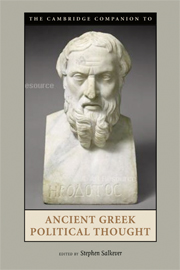Book contents
- Frontmatter
- Introduction
- 1 Homer and Political Thought
- 2 Foundings vs. Constitutions: Ancient Tragedy and the Origins of Political Community
- 3 Most Favored Status in Herodotus and Thucydides: Recasting the Athenian Tyrannicides through Solon and Pericles
- 4 Thucydides and Political Thought
- 5 “This Way of Life, This Contest”: Rethinking Socratic Citizenship
- 6 The Political Drama of Plato’s Republic
- 7 Practical Plato
- 8 Reading Aristotle’s Nicomachean Ethics and Politics as a Single Course of Lectures: Rhetoric, Politics, and Philosophy
- 9 Lived Excellence in Aristotle’s Constitution of Athens: Why the Encomium of Theramenes Matters
- 10 The Virtue Politics of Democratic Athens
- 11 Origins of Rights in Ancient Political Thought
- 12 The Emergence of Natural Law and the Cosmopolis
- Select Bibliography
- Index
9 - Lived Excellence in Aristotle’s Constitution of Athens: Why the Encomium of Theramenes Matters
Published online by Cambridge University Press: 28 September 2009
- Frontmatter
- Introduction
- 1 Homer and Political Thought
- 2 Foundings vs. Constitutions: Ancient Tragedy and the Origins of Political Community
- 3 Most Favored Status in Herodotus and Thucydides: Recasting the Athenian Tyrannicides through Solon and Pericles
- 4 Thucydides and Political Thought
- 5 “This Way of Life, This Contest”: Rethinking Socratic Citizenship
- 6 The Political Drama of Plato’s Republic
- 7 Practical Plato
- 8 Reading Aristotle’s Nicomachean Ethics and Politics as a Single Course of Lectures: Rhetoric, Politics, and Philosophy
- 9 Lived Excellence in Aristotle’s Constitution of Athens: Why the Encomium of Theramenes Matters
- 10 The Virtue Politics of Democratic Athens
- 11 Origins of Rights in Ancient Political Thought
- 12 The Emergence of Natural Law and the Cosmopolis
- Select Bibliography
- Index
Summary
An important and well-established trend in classical Greek political theory reads texts in their historical and political context as fully as the sources allow, believing that what we know about these texts' roles in the vigorous controversies of their own time helpfully informs efforts to use this material to reflect on our own time. In this chapter we bring this interpretative approach to bear on Aristotle's Constitution of Athens (hereafter AthPol), a text that tells the story of Athenian constitutional history over several centuries and presents a detailed account of the laws and institutions of the Athenian democracy of Aristotle's time. This text, recovered only in 1891, is often assumed to be of interest to historians and constitutional scholars but not to political theorists because, beyond occasional philosophical observations and/or expressions of political bias, it is said to neglect matters of normative concern. We disagree. In our view, complex normative concerns shape the AthPol, and history and theory inform each other in that text, as they do in Aristotle's ethical and political writings, more generally. For these reasons we support an integrated and continuous reading of Aristotle's practical works, including the Politics, Nicomachean Ethics, Rhetoric, Poetics, and AthPol. Although we do not address the issue of authorship directly, our argument contributes reasons for favoring Aristotle's authorship.
- Type
- Chapter
- Information
- The Cambridge Companion to Ancient Greek Political Thought , pp. 243 - 270Publisher: Cambridge University PressPrint publication year: 2009
- 2
- Cited by



